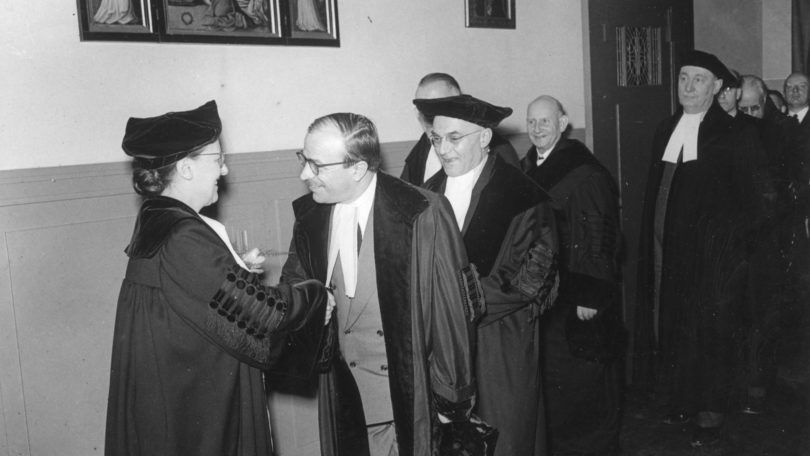First female professor smoked cigars with the men
-
 Christine Mohrmann wordt gefeliciteerd met haar hoogleraarschap appointed as a professor. Photo: Fotopersbureau Gelderland, Nijmegen
Christine Mohrmann wordt gefeliciteerd met haar hoogleraarschap appointed as a professor. Photo: Fotopersbureau Gelderland, Nijmegen
Christine Mohrmann had to fight hard for her position. Once she was appointed Professor she became one of the guys. And enjoyed lecturing the priests.
Christine Mohrmann (1903-1988) was a brilliant student and researcher, but it took her a long time to be appointed Professor. Her Nijmegen biographer Marjet Derks thinks this wasn’t only because women were not taken very seriously in academic circles, but also because of Mohrmann’s close relationship with her thesis supervisor, Jos Schrijnen. ‘She was an unmarried laywoman socialising with a priest and the brother of the Bishop of Roermond to boot. They lived across from each other in the Annastraat and often visited one other. They also attended conferences abroad together.’
‘To have her career obstructed in this way must have been difficult to bear.’
The close relationship between the two was food for much speculation. ‘In those days Nijmegen was quite a narrow-minded Catholic community. Her appointment as Professor was a boundary people didn’t want to cross. When a Chair became free in her department, a less qualified male colleague was appointed.’
Mohrmann was hurt and made no secret of it. ‘It was tragic, of course. Her entire life was devoted to science. She was always working. To have her career obstructed in this way must have been difficult to bear.’
Lady professor
In 1953, aged fifty, she was finally promoted. Mohrmann was renowned internationally for her research on Early Christian and Mediaeval Latin and when the professor in her field retired, there was no avoiding her anymore.
On her appointment as first female professor in Nijmegen, she subtly reminded the ‘Gentlemen Professors’ that they would now have to add ‘and Lady Professor’ whenever they addressed the academic community. She said: ‘I’m conscious, with a certain degree of humility, that my entering Your circle will cause more change than usually brought about by the appointment of a new professor. For example, as of now, I’ll be the only one among you still privileged to use the old form of address: ‘Gentlemen Professors’.’
The fact that she was a woman and had clear opinions certainly got tongues wagging, says Derks. ‘She was a strong presence. Everyone knew her.’ Mohrmann was a member of the famous ‘walking club’, a select group of Nijmegen professors, who met a few times a year to enjoy wine and cigars, and agree on new appointments. Mohrmann smoked along with them.
Not a feminist
She was strict. She received her PhD students at her home on Saturday mornings. She wanted to see texts. And if someone failed to complete a chapter, Mohrmann showed no pity. Derks: ‘I’ve spoken to grown men who years later still shudder as they talk about this most dreaded time of the month when you had to hand in a chapter and discuss it with her.’
In the lecture hall, she enjoyed lecturing the priests. ‘Priests sometimes found it difficult to accept authority from a woman, and she really enjoyed overruling them. She had her content at her fingertips. She always knew what she was talking about.’
But Christine Mohrmann was certainly not a feminist or an innovator. She abhorred the kind of activist students who appeared on campus in the 1960s. She found these young people stupid and rude.
Next week, a Vox special edition about the overrepresentation of women on campus and in town. You will also be able to read the issue online.



